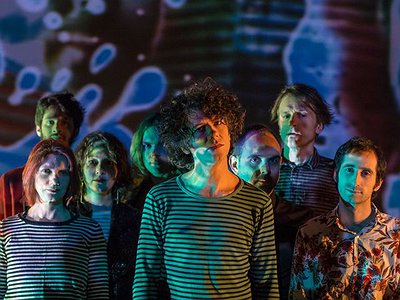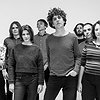With more and more musicians creating than ever and more and more of these creations being released, what does this mean for you as an artist in terms of originality? What are some of the areas where you currently see the greatest potential for originality and who are some of the artists and communities that you find inspiring in this regard?
I like that everyone's doing it and that the boundaries between player, composer and producer are becoming increasingly blurred. In a way, the former hierarchy has been flattened, meaning that it's more essential than ever to be singular and unique just to get yourself heard above the noise. There will always be originality and there will always be mediocre second-rate versions of the original stuff. This is true not only in all genres of music but in all the arts and probably in all forms of creative work, be it designing a new vacuum cleaner or inventing a special window.
Whatever a special window is.
How strictly do you separate improvising and composing?
One leads to the other. Improvising is just composing in real time. A great deal of my ideas come from just dicking about on an instrument until something good shows up, often by mistake. Sometimes it might be a little thing that creates and unexpected colour, which ignites a spark in your mind and an hour later there's a completed piece. I love it when that happens. Particularly in Guapo, the compositions are largely born out of improvisation. In Knifeworld, whatever improvisational process occurs, tends to happen in private. Like wanking. I present the band with the dried-up crusty tissues later and expect them to go to work.
How do you see the relationship between sound, space and composition and what are some of your strategies and approaches of working with them?
If you mean environment, actual physical space then I'm sure they influence me on a subconscious level but it's not really something I've ever really thought about. Pretty much everything seems to come out of my mind, or a combination of mine and other minds working together, regardless of where we are.
If you mean space in the music, that's a whole other thing. Knifeworld was, deliberately at first, incredibly dense. I loved that. People would tell me the stuff needed more space and I'd tell them to go and listen to Morton Feldman or Panasonic, both of whom I love, or better still nothing at all. I love making dense, information-rich pop music. Not enough people do it, although if my current financial status is anything to go by, there's probably a reason for that. These days we've allowed a little space to creep in. Generally, when you expand your band into an eight piece, it's not because you want to hear less notes, though.
What's your perspective on the relationship between music and other forms of art – painting, video art and cinema, for example – and for you and your work, how does music relate to other senses than hearing alone?
I feel that the creative process is the same in all of them. In my experience it seems to be an initial idea followed by a process of organisation, elaboration and refinement.
I would have loved, almost equally, to have been an author, a film director, a comic artist/ writer or a painter but for whatever reason, my mind works best with music. I was a very keen artist and as a teenager used to illustrate nearly as much as I played music but I was never totally satisfied with my work in the way I was with music. I may have done a drawing I was pretty happy with but maybe the chair in it didn't look right and no matter how much I reworked it, I could never quite get there. Now I know a lot of this has to do with practice and application but I never felt that barrier with music.
To give two recent examples, I read Chris Ware's Jimmy Corrigan: The Smartest Kid On Earth the other day. Man, the depth, scope and execution of this thing just knocked me out. I think it may be the best comic I've read and that's against some stiff competition. Ditto Shane Carruth's film, Upstream Colour, which I thought was devastatingly good. In a sense I feel, you know, even if I had applied myself from an early age I don't think I could have come up with something so complete, so visionary and so satisfying as these two works.
With music, even hearing the most extraordinary, mind-blowing thing, whether it's a Phil Spector tune or a piece by Bartok, tends to inspire rather than intimidate me. I still feel I'm a long way off getting to where I'd like to be but I know, if I can stay alive long enough, I'll get there or at least I'll get close. I don't feel like there's anything I couldn't achieve, musically, if I put my mind to it. I never get the feeling of "How the fuck did they manage that?" which I do with other great art. Although I find myself more moved by music than anything else, I feel more like, "OK, I know how you made that, I see you've raised the bar, I just need to get there myself". I genuinely feel that each new work will always be my best.
What's your view on the role and function of music as well as the (e.g. political/social/creative) tasks of artists today - and how do you try to meet these goals in your work?
Honestly, I don't know. I suppose everything is political if you're wearing those lenses. I think all art is a chance to re-imagine the world in a way you'd like it to be or to hold up a mirror and amplify or reframe the ugliness. Given that everything is born out of the imagination, from the most vile depths of inhumanity to the most staggering, wordless beauty, then responsibility lies in how you allow your imagination to manifest itself. We are living in a time of great meanness and brutality on a global scale. The monkeys are out of control, it's all I can think about these days.
Art is magic, it can alter consciousness. That's what magic is. There are forces, whether deliberate or not, fucking with you and the way you think, using language, misinformation, with indoctrination and suggestive, manipulative imagery, with propaganda and out and out lies. At the very least, in some small way, I'm just trying to put some light and joy into the world, trying to be one of the good guys.
Listening is also an active, rather than just a passive process. How do you see the role of the listener in the musical communication process?
I would want all my listeners to spend hours with my music, digesting and processing all the layers. Some will and some won't. I think that comes down to the quality of the work and the listener themselves. I was thinking the other day how, if you're reading a great book or watching a great film, you only really follow the narrative the first time round. What a drag to be an author or film maker and only have your creation experienced once by most of your audience. After spending all that time getting the language and structure or the framing, editing and lighting just right, nitpicking over one sentence or the way a line is delivered. Putting in all these details that reflect each other, ideas that reappear in a different form or echo earlier bits and they'll largely go unnoticed
In a way, music is the same. On the first couple of listens you only really tune into the melody or the chords or, more specifically with some listeners, the words. It's not until the tenth time round you might realise "Hang on! The bass line in the bridge is the same melody that the vocals were doing in the first verse, but transposed to a minor key". Most people don't notice that stuff. Nonetheless, everything has to be honest and correct. You can't put lazy notes or weak chords in there. It means the world to me when people actually pick up on this stuff, though. It sort of makes the whole thing worthwhile. Finally, someone gets it! It makes me grateful that music was my calling. Who gets a record and, if they like it, only listens once?
Reaching audiences usually involves reaching out to the press and possibly working with a PR company. What's your perspective on the promo system? In which way do music journalism and PR companies change the way music is perceived by the public?
It's my least favourite part of the process, but hey, I don't choose to be a cult. Actually I don't choose to be a minor character, hanging around in the dark, unlit corners on the periphery of a cult. That said, you have to do what you have to do. Having spent all my adult life following the bent path, I know what I do is not for everyone. I'm happy to have whatever help I can in getting my stuff out there. I always try to be entirely honest, both in the work and in talking about it. I love the mystery and I think there's enough of it in the music itself that won't be spoiled by me talking about the process. It's lovely to get a chance to answer probing and interesting questions such as these, rather than "How did you get your name?" or "How do you describe your music?"
Perhaps some artists work is entirely defined by the PR, who knows? I'm fairly sure I'm not one of them. Mostly, if anyone's even heard of me, they don't know where to put me.
Do you have a musical vision that you haven't been able to realise for technical or financial reasons – or an idea of what music itself could be beyond its current form?
Until 'they' invent the device that can mainline your thoughts directly out of your mind into a very real listenable/ watchable/ readable thing, then I think all artists do. I think this is where technology is heading, at least I hope it is, and when it finally arrives it will be ultimately liberating.
Pure imagination unleashed. Isn't that what we all want?
That said, have you heard The Only She Chapters by Prefuse 73? That record sounds like this device may already have been invented.
Visit Knifeworld online at www.knifeworld.co.uk



